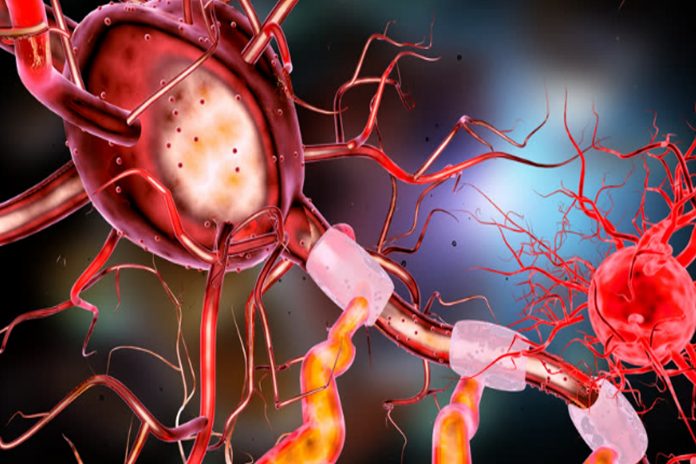Guillain-Barré syndrome is an autoimmune disorder where the body’s immune system attacks healthy tissues.1 In Guillain-Barré syndrome (GBS), the immune system attacks the peripheral nervous system. The peripheral nervous system controls the information sent from organs and other parts of your body back to your brain, and vice versa, like movements, respiration, and heartbeat. GBS is a rare neurological disorder that can be dangerous and sometimes fatal.
The nervous system has wire-like nerve projections called axons. These are usually covered in an insulator called myelin. In certain immune system disorders, the immune system attacks the myelin, so nerve signals can’t travel as efficiently.1 The immune system can also damage the axon and prevent signals from being received in the body.
Symptoms of Guillain-Barré syndrome
There is no definitive pattern to the onset of symptoms nor are symptoms the same for everyone. Some people notice weakness in their upper body first, and then it moves down into the lower body; Others notice weakness in the legs first. A common early sign is feeling weak while walking or climbing stairs, and, weakness is felt equally on both sides.1
In severe cases, the signals to muscles controlling breathing weaken and some people may need to be put on a ventilator. Paralysis can also be an end result of GBS.1
Other symptoms can include:
- spontaneous pain in the back and legs,
- difficulty swallowing, and chewing,
- problems with coordination,
- weakened bladder control,
- unusual heartbeat and blood pressure,
- poorer vision,
- trouble speaking,
- a “pins and needles” feeling in feet and hands,
- and problems with digestion.1
How is Guillain-Barré syndrome diagnosed?
Anyone can get Guillain-Barré syndrome, but it’s most common in adults over 50. A physical exam will be conducted where a doctor may look for:
- unusual sensations such as numbness and tingling,
- poor reflexes,
- and muscle weakness.1
The doctor may perform a spinal tap to extract fluid surrounding the spine (cerebrospinal fluid). If the fluid contains higher than normal protein levels, this can indicate Guillain-Barré syndrome.1 A nerve conduction test may also be given, measuring the rate at which signals are sent and received. A slower signal speed can indicate Guillain-Barré syndrome.1
Treatments for Guillain-Barré syndrome
Although there is no definitive cure, recovery from the symptoms of Guillain-Barré syndrome is possible.1 There are two possible treatments with high effectiveness if started within two weeks of symptom onset.
- IV immunoglobulin therapy. Healthy immune proteins are injected that can displace the dangerous immune proteins. These healthy proteins (antibodies) can attack the dangerous ones. For the patient, this treatment helps lessen symptoms.1
- Plasma exchange. Blood is extracted, and some bad immune proteins are removed and treated. The treated blood is then returned to the patient. This procedure can help clear out some of the harmful immune proteins.1
Recovery from Guillain-Barré syndrome
Recovery looks different for everyone and can range from weeks to years. Mechanical ventilation may be needed until the ability to breathe independently has been regained.1 Physical therapy is beneficial for regaining coordination, mobility, strength, and movement. The actual physical therapy will look different for each person, depending on the nature of their case. Blood thinners may be needed for those at risk for blood clots.1
Causes of Guillain-Barré syndrome
Guillain-Barré syndrome is not inherited1 like some other autoimmune diseases. Researchers are still unsure what causes the syndrome. Although the cause is unknown, correlations have been found with certain infections and vaccinations.1,2
Scientists have noted that the onset of Guillain-Barré syndrome begins after a viral infection in the respiratory or gastrointestinal system and even after surgery.1 Vaccinations, such as the COVID-19 vaccine, could also trigger the syndrome, but causation is not evident.1
One study tested the incidence of Guillain-Barré syndrome 21 and 42 days after the Janssen, Pfizer-BioNTech, and Moderna COVID-19 vaccinations.2 The researchers of the study in the United States extracted data from over 487 million COVID-19 vaccine doses. Of these doses, there were 295 reports of post-vaccination Guillain-Barré syndrome — a very small overall percentage. Researchers observed an increase in Guillain-Barré syndrome cases for only those who received the Janssen vaccine, compared to background incidence rates.2
How can you help?
Researchers are always looking for volunteers for clinical trials to help find prevention and treatment methods for Guillain-Barré syndrome.1 See the National Institutes of Health’s website for more information: https://www.nih.gov/health-information/nih-clinical-research-trials-you.
References
- Guillain-Barré syndrome. National Institute of Neurological Disorders and Stroke. Reviewed 14 Feb 2023. Accessed on 21 Feb 2023. Retrieved from https://www.ninds.nih.gov/health-information/disorders/guillain-barre-syndrome.
- Abara WE et al. Reports of Guillain-Barré syndrome After COVID-19 Vaccination in the United States. JAMA Network Open. 2023;6(2):e2253845. doi:10.1001/jamanetworkopen.2022.53845



